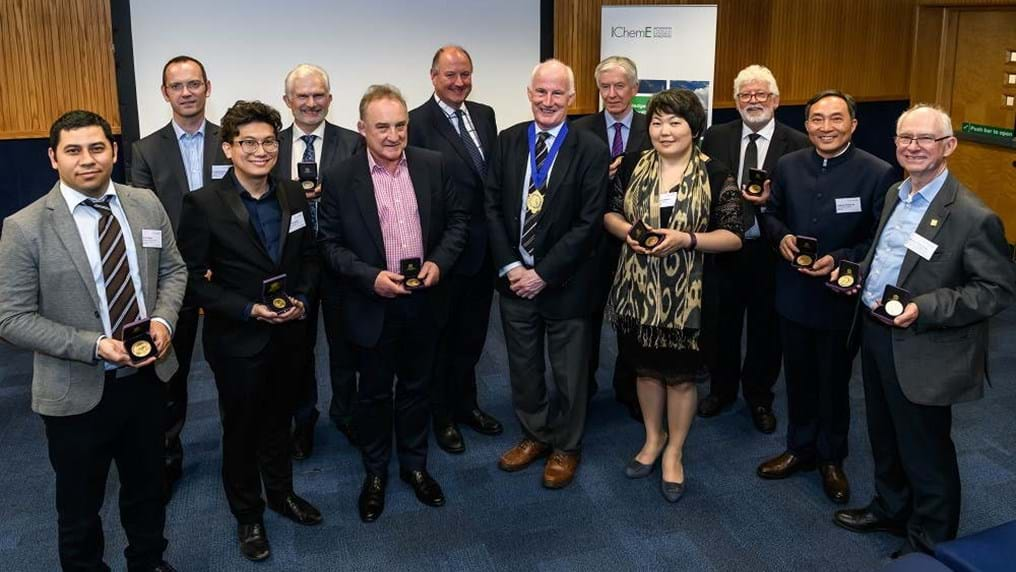Chemical engineers awarded medals for inspirational mentorship and research

24th May 2019
Ten chemical engineers were presented with medals by the Institution of Chemical Engineers (IChemE) in Birmingham yesterday (23 May) for their outstanding contributions to the profession.
For being a mentor and role model to chemical engineers at all levels, especially those at the early stage of their careers, KBR’s Barry Weightman was presented with the Davidson Medal.
Weightman volunteers in several capacities for IChemE’s qualifications activities, and has mentored more than 120 junior process engineers at KBR who are working to become Chartered Chemical Engineers.
Professor Colin Webb, University of Manchester, UK, was presented with the Council Medal for overseeing a substantial review of IChemE’s qualifications processes. His achievements have helped the Institution to continue to improve its provision of sustainable membership, accreditation and professional development processes.
Webb was also presented with the Donald Medal for outstanding services to biochemical engineering. He successfully introduced biochemical engineering undergraduate and Master’s degree programmes at Manchester, and founded the Biochemical Engineering Journal.
The Senior Moulton Medal was awarded to Benoit Chachuat and Nilay Shah, both Imperial College London, UK, and Ven Chian Quek, Imperial College London, UK and Group Research & Technology, PETRONAS, Malaysia. Chachuat and Quek were presented with the award on behalf of the group for their joint paper, which appeared in Chemical Engineering Research and Design, in April 2018.
The paper demonstrates and verifies a predictive mathematical model of high-pressure membrane contactors for natural gas sweetening applications. The authors were commended for the international collaborative efforts between academia and industry.
The Lees Medal is awarded by IChemE’s Safety and Loss Prevention Special Interest Group for a meritorious publication on the topic of safety and loss prevention. The medal was presented to Keith Miller for his paper Quantifying Risk and How it All Goes Wrong, presented at Hazards 28. The paper examines a 20-year study into the shortcomings with risk quantification and the detrimental impacts of how risk is perceived and mitigated.
Dr Wanqin Jin, from Nanjing Tech University, China, was recognised with the Underwood Medal for being a leader in the membrane community. He has made a significant contribution to membrane separation, with his research focussed on sustainable and environmentally friendly membrane separation production.
Dr Asel Sartbaeva, University of Bath, was awarded the Hanson Medal for her article Vaccines: The End of the Cold War?, which was featured in The Chemical Engineer, March 2018. It outlines the cost and practical implications in storing and transporting vaccines to keep vital medicines cold and explores the alternative solution for this.
Dr Ali Yetisen, Imperial College London, was awarded the Nicklin Medal for his commitment to advancing biochemical engineering through his research on biochemical sensors. David Edwards, Graherne/KBR, was awarded the Franklin Medal to recognise a distinguished career in chemical engineering in industry and academia, during which he has made theoretical and practical innovations in process safety and health.
Finally, John Challenger was recognised with the Greene Medal for more than 30 years of contribution to the continued development and success of the IChemE Forms of Contract, as well as his passionate promotion of their use within the industry.
IChemE President, Ken Rivers, presented the medal winners with their awards at a special ceremony in front of friends, family, and colleagues on 23 May at the International Convention Centre in Birmingham, UK.
He said:
“For your excellent research, passion to share knowledge and enhance chemical engineering practices, and guiding the next generation of chemical engineers, every one of you thoroughly deserves your award.
“Congratulations to all the winners of IChemE’s medals and prizes and thank you for your ongoing dedication to the profession.”
IChemE’s medals and prizes open for nomination on 1 September 2019. For more details on each prize and to nominate a peer, visit: www.icheme.org/medals
Image
A group photograph of the 2018-19 medal recipients at the special ceremony in Birmingham, UK
Links
Contact
For more information please contact:
Rachael Fraser, Communications Executive, IChemE
t: +44 (0) 1788 534435
e: rfraser@icheme.org
Ketna Mistry, Communications Executive, IChemE
t: +44 (0) 1788 534484
e: kmistry@icheme.org
What is chemical engineering?
Chemical, biochemical and process engineering is the application of science, maths and economics in the process of turning raw materials into everyday, and more specialist, products. Professional chemical engineers design, construct and manage process operations all over the world. Oil and gas, pharmaceuticals, food and drink, synthetic fibres and clean drinking water are just some of the products where chemical engineering plays a central role.
IChemE
The Institution of Chemical Engineers (IChemE) advances chemical engineering's contribution worldwide for the benefit of society. We support the development of chemical engineering professionals and provide connections to a powerful network of around 37,000 members in 100 countries.
We support our members in applying their expertise and experience to make an influential contribution to solving major global challenges, and are the only organisation to award Chartered Chemical Engineer status and Professional Process Safety Engineer registration.
More information: www.icheme.org